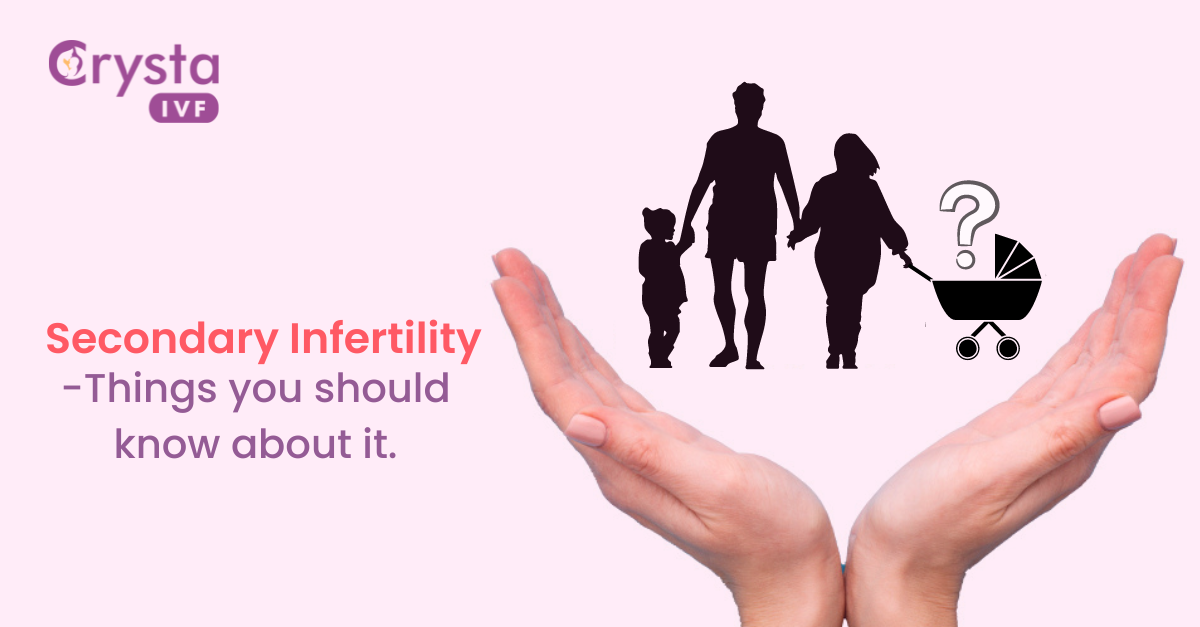Secondary infertility is much less talked about but equally emotionally, mentally, and physically traumatic.
It is estimated that about 20-25% of all infertility cases in India are attributed to secondary infertility. Just like primary infertility, it is a common issue among men and women of reproductive age.
Fortunately, medical treatments are available to treat the issue and help you conceive. But first, we’ll understand the meaning of secondary infertility, how it differs from primary infertility, its causes, and the symptoms.
What is Secondary Infertility?
Secondary Infertility is defined as the inability to conceive or carry a pregnancy to term after already having given birth to a child. The issue is more common than you know.
Though there’s an essential difference between primary and secondary infertility, both conditions are attributable to the inability to get pregnant, i.e., infertility.
Infertility is a condition in which a couple has failed to conceive after trying at least 1 year of unprotected sexual intercourse.
Primary infertility is when someone has never been able to get pregnant. Secondary infertility is when someone has had at least one pregnancy in the past but is now having trouble getting pregnant again.
The causes of secondary infertility are just as varied as the causes of primary infertility and can range from medical problems to lifestyle choices. While there is no absolute cure for secondary infertility, treatments available may help you conceive.
Common Signs of Secondary Infertility
If you’ve been trying to conceive for a while now without success, you may be wondering if there’s something wrong. Could it be that you have secondary infertility?
The inability to conceive or carry another pregnancy in itself is the significance of secondary infertility. However, there can be other signs that you may notice if you’re having difficulty conceiving. This include-
- Irregular menstrual cycle
- Miscarriage
- Painful periods
- Pain during intercourse
- Reduced sex drive
Secondary Infertility Causes in Women
Secondary infertility in women can feel isolating and frustrating. After all, you’ve been through the process of conceiving and carrying a child before, so why is it so hard this time around?
There are many possible causes of secondary fertility, from changes in your reproductive health to outside factors like stress or age.
Here is the list of the most common cause that may cause infertility in women after conceiving naturally for the first time:
Endometriosis:
A chronic condition where endometrial-like tissue grows outside the uterus, which induces a chronic inflammatory reaction, scar tissue, and adhesions that may damage female reproductive organs such as fallopian tubes, ovaries and may also affect areas outside the pelvic cavity.
Read more: What is Endometriosis? Symptoms and Causes
Problems in the quantity or quality of eggs:
Every woman is born with a certain number of eggs in her ovaries. The number of eggs decreases as she ages, especially after her 40s and beyond. Moreover, the remaining eggs may have conditions like chromosomal problems that are unsuitable for pregnancy. Therefore, age is the most significant factor in female fertility.
Obstruction in the fallopian tubes:
The chances of secondary infertility may be higher if an obstruction in the fallopian tube carries eggs from the ovaries to the uterus. The blockage can be caused by pelvic infections such as gonorrhea or chlamydia.
Polycystic ovary syndrome (PCOS):
PCOS is a chronic & lifelong condition caused by an imbalance of reproductive hormones. The health condition can impact your fertility and health, and it affects the ovaries and involves abnormal hormonal changes and clumps of fluid-filled sacs called cysts.
Ovulation problems:
Secondary infertility can also arise due to issues with the release of an egg from the ovaries (ovulation).
Lifestyle Changes:
Poor lifestyle choices such as excessive weight gain, unhealthy eating habits, excessive alcohol consumption & caffeine intake might also cause infertility in women.
Secondary Infertility Causes in Men
The chances of secondary infertility due to male factors are also as common as in females. Just like with primary infertility, there isn’t always a single cause for secondary infertility.
There can be many possibilities that may cause infertility in men. This includes –
Low testosterone levels:
Male testosterone plays a crucial role in sperm production. However, it can be reduced due to aging, genital injuries, and other health conditions such as genital infections, diabetes, blood disease, etc.
Low Sperm Quality:
The quality of sperm may decline as the person ages, which may lead to unhealthy and malformed sperm that are unsuitable for pregnancy.
Know Better: Signs of Low Sperm Count
Prostate removal:
The prostate is a small gland that sits just below the bladder in men. The primary purpose of the prostate is to produce seminal fluid, which helps transport sperm during ejaculation. Conditions where the prostate is removed, may cause semen to flow backward.
Lifestyle Factors:
Unhealthy lifestyle changes can also lead to infertility. This includes excessive alcohol consumption, smoking, excessive weight gain, stress, etc.
Exposure to excess heat or harmful chemicals:
Extreme exposure to heat and harmful substances such as industrial chemicals and pesticides can affect male reproductive organs and thus leads to infertility.
What Are the Treatments Available for Secondary Infertility?
It can be very frightening and confusing if you have difficulty conceiving, especially if it’s something that hasn’t happened before. But the first step in treating infertility is figuring out the cause. To do this, your doctor may recommend some fertility tests, including blood tests, pelvic exams, a transvaginal ultrasound, etc.
These tests can help identify potential problems and create a plan to address them. Secondary infertility treatments are available to help you conceive if you’re diagnosed with the condition. This includes –
Medications:
Your fertility doctor may recommend several medications, hormone therapy, antioxidants, and anti-aging supplements that can improve sperm count and support ovulation. You’ll be guided on how frequently it should be taken.
Surgeries:
In certain infertility cases, a surgical procedure can be carried out to repair structural problems, such as removing scar tissue, polyps, and fibroids from the uterus in females or sperm retrieval in males. This includes surgeries like laparoscopy, hysteroscopy, and Vasectomy reversal.
Lifestyle Improvements:
A healthy lifestyle and nutritional diet can significantly impact your fertility. Your healthcare provider can recommend several lifestyle changes, such as reduced alcohol consumption, daily exercise, weight control, stress management, etc., to provide all the nutrients and chances your body needs in order to conceive.
Assisted Reproductive Technology (ART)
Intrauterine insemination (IUI):
IUI, or intrauterine insemination, is a fertility procedure in which the woman’s uterus is entered during ovulation to directly place a man’s sperm into her uterus for fertilization. This infertility treatment can also help women who have unexplained infertility or may be unable to conceive through conventional intercourse due to health conditions like cancer or endometriosis.
In vitro fertilization (IVF):
IVF is a fertility treatment that involves fertilizing an egg with sperm outside the body. It can be used to treat infertility or test embryos for genetic disorders. IVF is a widely used option when other infertility treatments have failed or if there are multiple factors to infertility, such as blocked fallopian tubes and low sperm count.
Intracytoplasmic sperm injection (ICSI):
The technique is performed along with the conventional IVF process. The process involves physically injecting a single sperm cell into an egg for fertilization after the egg retrieval procedure in IVF. ICSI IVF is often recommended in case of male factor infertility problems or to improve the success rate of in vitro fertilization (IVF).
Don’t Hesitate to Consult a Fertility Expert
Couples need to realize that their infertility is not their fault and does not reflect negatively on them as individuals or as a couple. That being said, there are plenty of things couples can do to improve their chances of having a successful pregnancy.
If you think you may be dealing with secondary infertility, start by discussing it with your partner. Having a supportive partner who helps make sense of the situation is critical. Don’t hesitate to ask a fertility specialist if they have any recommendations regarding testing, treatments, or medications that could help.

Fertility specialists at the best IVF center in Delhi at Crysta IVF have decades of experience treating infertility and making parenthood possible for couples. So it’s essential to be guided by someone specializing in infertility care and treatment, including IVF and donor eggs.What is Secondary Infertility? Causes and Effects




